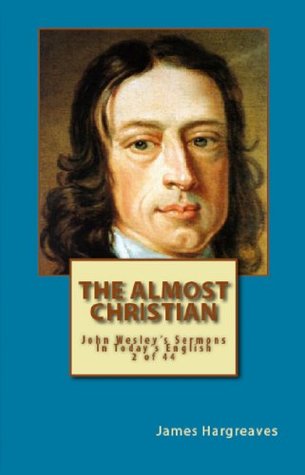- Bible
- Read the Bible
- Bible Versions
- Verse of the Day
- Reading Plans
- Verses by Topic
- Books of the Bible
- Bible Images
- Study
- Commentaries
- Concordances
- Dictionaries
- Encyclopedias
- Sermons
- Bible Atlas & Maps
- BP Wiki
- Devotionals
- Today's Devotionals
- Light of the World
- All Devotionals
- Inspirational Quotes
- More
- Picture Quotes
- Videos
- Inspirational
- Bible Study
- What The Bible Says
- Bible Q&As
- Daily Bread
- Bible by Genre
- Bible Stories
- Random Bible Verse
- Community
- Store
The Almost Christian: John Wesley's Sermon In Today's English (2 of 44) (John Wesley's Forty-Four Sermons in Today's English)
by John Wesley
John Wesley led one of the greatest Christian revivals in the history of England, and his open air preaching saw many thousands of conversions all across Great Britain. The ‘Forty-Four Sermons’ which he compiled for use by Methodist Local Preachers remains a timeless classic, and a definitive collection of core Wesleyan doctrine, along with his Notes on the New Testament.
Forty-Four Sermons was first published in 1759, over 250 years ago, and since then the English language has changed and evolved to the point that his works can no longer be easily read and understood in their original dialect. Therefore to preserve Wesley’s message and to allow it to come to life for a new generation, this project has been undertaken.
The sermons are translated sentence by sentence, carefully and prayerfully. The aim has been to communicate both word-for-word and thought-for-thought, choosing clarity of communication in simple English over archaic sentence structure where necessary, and preferring the original word order when there is no difference.
Wesley used the King James Bible in his original sermons, whereas to remain consistent with the word-for-word and thought-for-thought method used in these translations, the New International Version and New Living Translation have been used instead. The complete original sermon is also included. Each sermon will be translated and published in order, from 1 to 44, and when the series is completed, they will be published as one volume.
Forty-Four Sermons was first published in 1759, over 250 years ago, and since then the English language has changed and evolved to the point that his works can no longer be easily read and understood in their original dialect. Therefore to preserve Wesley’s message and to allow it to come to life for a new generation, this project has been undertaken.
The sermons are translated sentence by sentence, carefully and prayerfully. The aim has been to communicate both word-for-word and thought-for-thought, choosing clarity of communication in simple English over archaic sentence structure where necessary, and preferring the original word order when there is no difference.
Wesley used the King James Bible in his original sermons, whereas to remain consistent with the word-for-word and thought-for-thought method used in these translations, the New International Version and New Living Translation have been used instead. The complete original sermon is also included. Each sermon will be translated and published in order, from 1 to 44, and when the series is completed, they will be published as one volume.
BUY NOW
Kindle Edition, 60 pages
Published December 13th 2013 by Hargreaves Publishing
© 2025 Bibleportal.com All rights reserved.

John Wesley (1703 - 1791)
Was an Anglican cleric and Christian theologian. Wesley is largely credited, along with his brother Charles Wesley, as founding the Methodist movement which began when he took to open-air preaching in a similar manner to George Whitefield. In contrast to Whitefield's Calvinism, Wesley embraced the Arminian doctrines that were dominant in the 18th-century Church of England. Methodism in both forms became a highly successful evangelical movement in Britain, which encouraged people to experience Jesus Christ personally.Wesley helped to organise and form societies of Christians throughout Great Britain, North America and Ireland as small groups that developed intensive, personal accountability, discipleship and religious instruction among members. His great contribution was to appoint itinerant, unordained preachers who travelled widely to evangelise and care for people in the societies. Under Wesley's direction, Methodists became leaders in many social issues of the day, including the prison reform and abolitionism movements.
John Wesley was an Anglican cleric and Christian theologian. Wesley is largely credited, along with his brother Charles Wesley, with founding the Methodist movement which began when he took to open-air preaching in a similar manner to George Whitefield. In contrast to George Whitefield's Calvinism (which later led to the forming of the Calvinistic Methodists), Wesley embraced Arminianism. Methodism in both forms was a highly successful evangelical movement in the United Kingdom, which encouraged people to experience Christ personally.
Wesley believed that this doctrine should be constantly preached, especially among the people called Methodists. In fact, he contended that the purpose of the Methodist movement was to "spread scriptural holiness across England."
Throughout his life, Wesley remained within the Church of England and insisted that his movement was well within the bounds of the Anglican tradition. His maverick use of church policy put him at odds with many within the Church of England, though toward the end of his life he was widely respected.
John Wesley was the founder of the Methodist movement which grew from the 'Holy Club' of his Oxford friends into a great religious revival. An indefatigable traveller, preacher and writer, Wesley averaged 8,000 miles a year on horseback and gave 15 sermons a week. The reluctance of the Anglican clergy to lend him their pulpits led him to give some of his sermons in the open air, a decision which enabled him to reach those among the poorer sections of society who were not accustomed to going to church.
... Show more